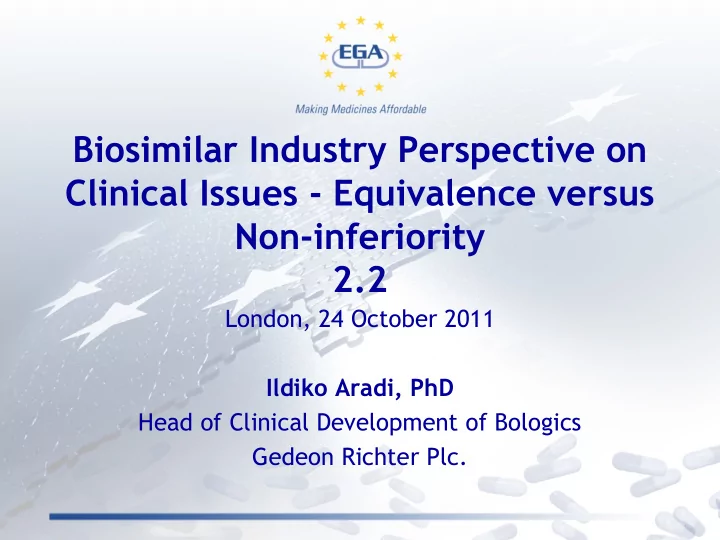

Biosimilar Industry Perspective on Clinical Issues - Equivalence versus Non-inferiority 2.2 London, 24 October 2011 Ildiko Aradi, PhD Head of Clinical Development of Bologics Gedeon Richter Plc.
Comparability exercise to establish biosimilarity
Physicochemical and biological similarity • Physicochemical similarity is established • Biosimilarity of biological properties is demonstrated by a broad panel of assays • The proved physicochemical and biological similarity, without the interference with disease related factors, can strongly indicate that the reference and the biosimilar mAbs have also similar effects in patients
Clinical similarity The focus of the clinical comparability trials is to demonstrate similar efficacy and safety compared to the reference product Comparability margins have to be pre-specified and justified based on clinical relevance Adequate data on the effect size should be considered to support the selection of the margin The biosimilarity margin(s) for the main efficacy endpoint need to be justified on both clinical and statistical grounds Ensure that there is no clinically relevant differences in efficacy Prove that there is no important loss of efficacy if the test product is used instead of reference Similar safety needs to be maintained for biosimilars during the clinical trial to demonstrate comparability
Clinical comparability: equivalence or non-inferiority trials Equivalence trials - two-sided comparability margins defined • Clinically meaningful differences between the test and reference are excluded • According to the currently available biosimilar guidelines, demonstration of equivalence is required for some indications where the desired therapeutic effect range is pre-determined. Non-inferiority trials – one-sided comparability margin defined • It is intended to prove that the test product is not inferior to the reference • In case of biosimilar developments, especially for oncology indications or in the case of autoimmune diseases proof of non-inferiority seems to be also acceptable.
Clinical comparability: equivalence or non-inferiority efficacy trials Acceptability of non-inferiority trials under certain circumstances: Strict two-sided equivalence is not required to demonstrate comparable efficacy from scientific point of view – Not meeting the upper margin would only mean benefit without posing additional risk for the patients especially in certain indications, e.g. ORR oncology, ACR20 in rheumatoid arthritis and in non-inferiority design it would not cause the failure of the trial Non-inferiority trials for certain efficacy endpoints can be justified – Only the lower margin of comparability is predefined to prove that the product is not inferior to the reference – Non-inferiority margin needs to be justified on both clinical and statistical basis – It is thought to be unethical to dose more patients in a biosimilar development than scientifically necessary Comparable safety needs to be maintained for biosimilars
Conclusions Biosimilarity is claimed on the basis of thorough comparability program regarding quality, non-clinical and clinical comparability, and the results should be assessed in that context. Based on this scientific approach applied for biosimilars we have a specific situation where non-inferiority clinical trial designs can be justified confirming clinically relevant comparability. Based on demonstrated physicochemical and non-clinical similarity, it is not expected that the biosimilar would prove to be better with statistical significance in the last step of the comparability exercise. The involvement of more patients than scientifically justified for non-inferiority clinical trials would be unethical. Biosimilars need to be assessed within the context of the whole data package on comparability .
Recommend
More recommend